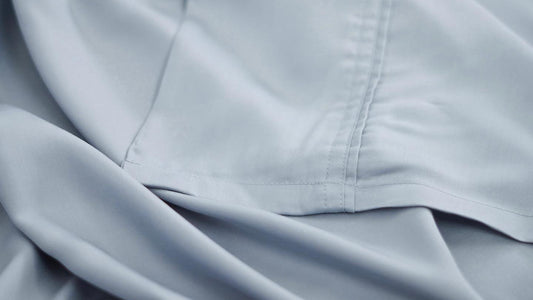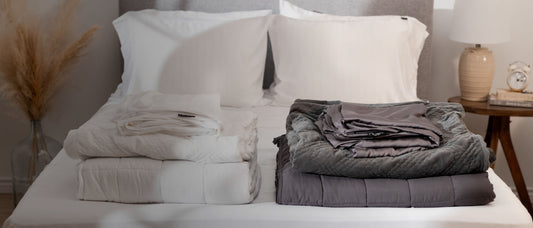Apart from visible tear and wear of your mattress, are there really any other signs of when you should opt for a new one? According to the Sleep Foundation, the mattress lifespan is something around 6 to 8 years; however, it varies and greatly depends on various variables. There are clear signs that help you understand your mattress can no longer provide you with a good night's sleep.
Here, you will learn how to determine that you need to replace your mattress, how it can degrade your sleep quality, and, finally, which mattress material is the best for you.
Top Five Ways to Know When It's Time to Buy a New Mattress

The mattress lifespan depends on two major things: the mattress type and its quality. It's not a surprise that higher-quality materials tend to last longer and provide more sleep comfort than their cheaper alternatives.
When Should You Get a New Mattress?
Here are five main problems that typically occur when it is time to change your mattress. If you happen to experience even one of them, it is high time to make some changes and opt for a quality mattress.
Noticeable Wear and Tear
Wear and tear is a normal occurrence after intended and long-term use of a product, and probably it is also the most common reason why people finally make up their mind to get rid of a mattress. If other signs can be hard to spot, these visible flaws are hard to ignore.
A worn-out mattress can have broken springs that stick out and poke you. This is typical for old innerspring mattresses that have been used for an extended period of time. The springs tend to break on the exact spot where you like to sit or sleep.
If you have a damaged memory foam mattress, you will notice spots that sink in or shift, making it uncomfortable to sleep.
Saggy mattresses have bumps or indentations that make finding a good sleeping position almost impossible. Therefore, even if the lifespan is stated 9 years by the manufacturer, but you started to have these problems earlier - it's high time you said goodbye to your old bedding.
You Experience Allergies or Asthma Symptoms
If your mattress is in good shape, but you constantly feel allergic or suffer from asthma symptoms, there is a high chance it is caused by dust mites or mould and mildew. Cleaning the mattress regularly might not be very effective.
Dust mites feed on dead skin cells in the mattress. Although they don't bite, they do create allergens that cause health problems when being exposed to them for a long time.
Mould and mildew that are developed in the mattress pose great health risks like migraines and breathing difficulties. Caused by humidity, you can be sleeping on the damp, mouldy mattress and breathe allergens that will never let you have a restful sleep.
Since there is no effective way of successfully getting rid of all the dust mites and mould quickly, it is best to replace your mattress, wash the sheets once a week, and keep the humidity levels low.
Your Mattress Makes Disturbing Noise
If you have an innerspring mattress, sooner or later, you will start hearing spring noises whenever you sit or lay down on your bed. This means the coils start to break or sag, no longer able o support your weight. You will be awakened by your or your partner's slight movements, and as the mattress keeps sagging, eventually, you will feel springs puncturing your body.
You Wake Up With Muscle Pain
A quality mattress is supposed to support your body and keep your spine aligned through the night, which in turn lets you wake up refreshed and well-rested. However, if you feel the opposite, particularly stiff and sore, then you need to change your mattress.
All foam mattresses tend to lose their shape over time, and sleeping in one place may leave a dent in the mattress. You may start to feel the bed's foundation, and lack of support will lead to aches and pains in the morning.
Your Sleep Quality Has Decreased Drastically
If you keep tossing and turning around in bed and waking up tired, then it is most likely because your aged mattress is no longer in good shape. Its padding or springs are either shifted or broken, and you basically sleep on the saggy or lumpy mattress. Your body and mind need full 8-9 hours to regenerate and process all the information; that is why you shouldn't neglect your sleeping routine and opt for a quality mattress and pillows.
Reasons Why You Might Want to Replace Your Old Mattress With an Even Better One

The main reasons to buy a new mattress are your comfort and good night's sleep. The latter is an undisturbed sleep that lasts for over 8 hours. When buying a new mattress, make sure the firmness and support are suitable for your body weight.
If you are not fully persuaded to replace your mattress, here are other reasons why you might want to replace your old bed today - health issues. Not getting enough rest per night leads to sleep deprivation, and its symptoms like:
- Lack of energy
- Mood swings
- Difficulties with thinking and concentrating
Ongoing sleep deprivation can pose a great risk to physical and mental health. The possible consequences include:
- Heart problems
- Diabetes
- Obesity
Overall, lack of sleep leads to reduced quality of life; that is why it is so vital to take care of your health by having sufficient sleep and nutrients.
Five Tips for Choosing the Best Replacement Mattress

Here are five tips to help you choose the best mattress on the market. These guidelines will help you focus on the criteria chosen by you and for you. Next time you decide to shop online, you will definitely know what you are looking for.
Mattress Components
There are different mattress types, and knowing a little about each will help you decide which you prefer the most:
- Foam: Memory foam mattresses are manufactured with foam and contain no springs in them.
- Innerspring: Innerspring mattresses use a coil system and additional layers.
- Hybrid: Hybrid mattresses combine bouncy innerspring with soft and comfy foam.
- Latex: Mattresses that are manufactured with latex rubber are bouncy and retain their shape for longer when maintained well; however, these can get hot and ruin your sleep.
Maintenance of a Mattress
Your mattress will last longer if you vacuum and clean it regularly. You should also remember to rotate your bedding once in a couple of months, so the foam or springs won't lose their shape over time. As additional protection, you can purchase a mattress protector and clean it regularly, too.
Keep in mind that pets and children can damage the mattress by jumping and scratching it. They can also add extra weight and reduce the longevity of the bedding.
Firmness
To have improved sleep, you should choose the firmness level that is ideal for you and your partner. If you are shopping in a store, it is best to simply lay down on a mattress for ten minutes in your favourite sleeping position and see if it works well for you.
The firmness level ranges from extra soft to extra firm and depends on the total weight on the bed. Since this factor is highly subjective, you should decide which firmness is most comfortable for you.
What Are the Best Replacement Mattresses for Back Pain Relief?
For people suffering from backache, it is best to opt for a supportive and medium-firm mattress for a better night's sleep. You should choose bedding that provides pressure relief and is not too hard or soft on your back.
Body Weight
Bodyweight matters only when choosing the firmness of the mattress. It also depends on how many people sleep in a bed and how soft or firm you wish it to be. For example, if you look for a mattress for yourself and a partner, you might prefer a medium-firm mattress. However, if children were to join you, choosing a bit firmer mattress would be better.
Sleeping Position
Your sleeping position plays a great role and can help you determine which mattress is the best for you.
If you prefer to sleep on your back, clearly, the most pressure falls on your lower back. That is why you need a mattress that is firm in the middle so your body wouldn't leave a dent in the bed over years of sleeping in the same position.
If you sleep on your stomach, the most pressure is on your chest and lumbar spine. Therefore, a firm mattress will prevent your body from sinking into the bed.
And, finally, side sleepers or those who tend to sleep in multiple positions per night will benefit from medium-firm mattresses, so the shoulders and hips will neither sink nor puncture a mattress, and it will be easier to turn around.
How Often Should You Replace Your Mattress?

The lifespan of a mattress depends on materials and their quality. The way you use the mattress also reduces or prolongs your bed's longevity.
- Innerspring mattress: Lasts up to 10 years or longer if you rotate it periodically.
- Memory foam mattress: High-quality foam can last about 10 years.
- Hybrid mattress: This type can last up to 8 years, depending on the quality of materials.
- Latex mattress: Latex rubber is a highly durable material that can last up to 15-20 years.
Conclusion
Hush has a perfect solution for people who like to turn in bed and want to stay cool throughout the night - The Hush Mattress. Here, you benefit from a cooled innerspring mattress with an innovative design to give enough softness and support for your back and ultimate comfort.
It is a one-of-a-kind mattress with 10 years of warranty and vital accessories to make your sleeping experience over the top. It is also ideal for people with back pain as the mattress is well supported in the middle to keep your sleeping posture natural.






